Poems From the Pond
Peggy Freydberg's sharp sense of humor and observation are at odds with this book’s presentation.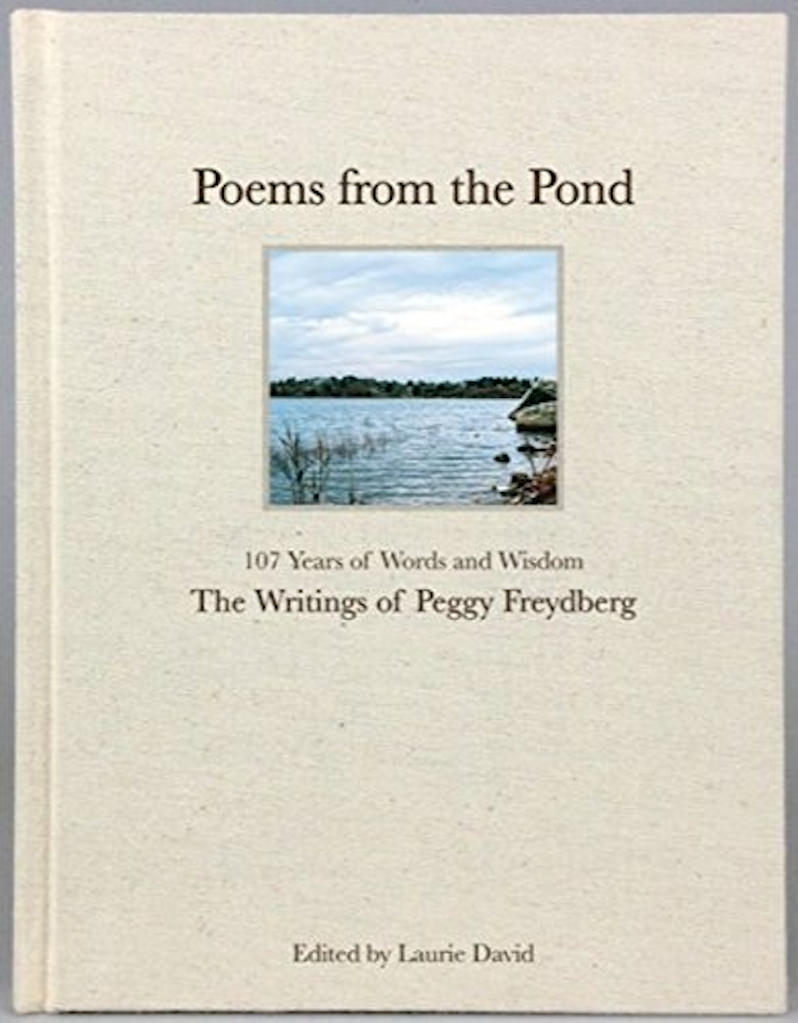
“Poems from the Pond: 107 Years of Words and Wisdom—The Writings of Peggy Freydberg” A book edited by Laurie David
The following two poems by Peggy Freydberg were reprinted with permission from “Poems from the Pond.” All net profits go to the Margaret Howe Freydberg Scholarship Fund.
Poems from the Pond: 107 Years of Words and Wisdom—The Writings of Peggy Freydberg Purchase in the Truthdig Bazaar
“The Swimming Lesson”
“There’s the little family,” I cried. He came to stand beside me, watching the splendid slow progress on the pond, this calm clear summer morning, of a flotilla of wild geese – the goose, the gander, and their seven goslings.
Propelled invisibly by busy feet beneath the surface of the water, They seem as stationary, and as one-dimensional as a toy of wooden birds strung on a knotted cord. One only knows they move because behind the line of them, A V-shaped wake appears, And slowly widens.
We stand, This man and I, So old, So near our endings, Watching The miniature and mighty convoy Moving in a line as straight as though a ruler had underscored it— The great, unerring, long-necked gander leading, The seven goslings, way below him, following, Each space between obedient baby birds, not by a fraction different, And bringing up the rear, In queenly and impeccable positioning, The goose who hatched and laid The seven golden eggs, Gliding in serene pride of it.
If I were a goslin, I thought, I would never have to doubt my trust in those two parents, who fly free and wild, and mate for life, and who conduct their lives, and guard their nests, with a nobility I ascribe to them because their behavior is my definition of it.
I have a sudden recognition of why it is that he, and I, are standing here. I may have always known, in languageless recesses of myself, about the primal and perfected craft of the guiding, and the guarding, of existence. But today, with wondrous grasping, I see, in a goose, a gander, and their seven goslings, a stately demonstration of First Purpose, wearing its eternal smile.
We stand together, he and I, so old, so near our endings, and watch, with wonder, and with wanting, the pure and sure beginnings of seven goslings being taught to swim in a straight line.
“What I Always Wanted to Be Is Bare”
I am sitting on the steps of a small, empty old farm house, under a lilac bush as high as the roof.
You are sitting against a tree a few feet away.
Here is an essential bareness, a small entirely empty house— two rooms, a lilac bush, a hill sloping down from the front stoop to the valley.
Be with me in this bareness. We need to be what we are— two empty rooms of an old house and a lilac bush— your lost bareness, and mine
Fear of bareness bought the Ferrari in the three car garage of the house we built thirty years ago with Fortuny draperies hanging along the pitted lavender window panes bought at auction and installed in the dining room paneled with dark wood found in an old house in Connecticut.
Fear of bareness bought the Ferrari and the Fortuny draperies and the wines of the right year.
What covers our souls is the silk wallpaper. What keeps us strangers is what we think we need. When what we need is only the bareness of ourselves. Only two ancient rooms grateful for being empty, and an ancient lilac bush giving out sweetness.
I have always wanted to say only three words to you: You. Me. Us. No one of them adjective beyond its essentiality. Only you, and me, and us, bare as the day we were born. I have always wanted us, bare on a composted forest floor— the essential bed.
I sit on the stoop, for a moment knowing bareness absolutely. You sit against a tree, looking away toward the valley, planning how much you will offer Taggert for the house. There is a part of you that wants to buy its bareness.
I always wanted, more than silk wallpaper, bareness. And I have lived all my life covered up and trying to be bare. I have lived all the years of my life with you, wanting you to be bare, so that I could be.
Maybe bareness is not what you needed from me. Maybe you needed the smooth neck that warmed the string of sixty pearls you gave me for my sixtieth birthday? And when the smoothness began to sink into folds, you were no longer glad for pearls, for I was now bare and could not be adorned?
Bareness—beneath the young skin and beneath the old skin— did you ever want either?
I mean, did you ever want me? Or only me, covered/ Because to want me bare, you would have to be bare.
But I have gotten to need to be covered. And so have you. Our ancient bareness, yours and mine, is a communion that can never be.
The world nearly always covers bareness.
* * *
In turbulent times, poetry offers a sense of connection, a deeper understanding of living. This holds true for poems that are overtly political or excitingly abstract, and also for poems that are quietly honest, about small detail. I’m aware that certain poems I’m not very thrilled about speak to somebody — and some that I love, other people don’t care for. That’s fine. Lord knows I seem to be the only human on the planet who doesn’t love YouTube kittens.
My sentiments about kitten memes probably prove that I am a dark cloud of doom unable to take part in the joy of humanity. Be that as it may, I like poetry. Sometimes I even read cheerful poems. Occasionally, even cheerful cat poems.
What I find discouraging are poems wrapped in unnecessary frou-frou. Poetry shouldn’t be served up like cod liver oil for unhealthy times, but it also doesn’t need to be packaged like expensive chocolate. I like a beautiful book as much as the next person; I have littered my personal world with objects that I find lovely. But hagiography isn’t what poetry needs. It sure as hell gets in the way of art.
This is my great frustration in reading “Poems from the Pond: 107 Years of Words and Wisdom — The Writings of Peggy Freydberg.” So far as I can tell, author Peggy Freydberg was not a saint. She was a flawed, interesting woman who lived a very long life. She loved her family and her cats, but she also studied herself intensely, her reactions to the outside world and the emotional internal one. She wrote a couple of very good poems, which is as much as any poet can hope for. And Freydberg was lucky. She had 107 years of life to work with, and on, her writing, and she curated the details of her life carefully:
I like to think it matters to the lilac that its evolutionary purpose is to tease me
But her sharp sense of humor and observation are at odds with this book’s presentation. Her poetry is undercut by the reverence that oozes from the expensive production values. Design is not what makes me want to read a poem, no matter how the ribbons are wrapped or how the sacred smoke wafts toward me. Freydberg doesn’t need these things. If anything, the cloud of worship gets in the way.
For example, why did the editor choose the self-conscious typewriter font? Fonts are always tricky — Comic Sans, anyone? — so why space the poems out as if they need to be framed elaborately for us to notice them? Let the poems be read, and stop fussing. Also, as readers, are we incapable of appreciating Freydberg’s words without random lushly colorful photographs? My attention is distracted by the fact that, following a poem about geese, there is a photograph of a heron. Is that intentional? I assume not, but then, further on, there’s a photo that seems to be a sunset, illustrating a poem about sunrise.
I put the book down on the coffee table and flee the living room.
After a few hours, I edge back into the room, prepared to get over the design and just read the darn poems. The various introductions and memories about Freydberg weigh me down, but I struggle bravely on. I get briefly tangled up with a white wedding album ribbon, attached as a bookmark. Fine, I tell the book, I get it, you are Important, Valuable, a Good Gift Item for Troubled Times. I’m surprised I am so emotional about a white satin ribbon.
I make myself a cup of tea and sit down in another attempt to read the book.
The problem with my concentration, in case I’m not being clear, has really nothing to do with Peggy Freydberg or her poems. It’s that this book feels more like an album at the author’s memorial service.
The book includes a letter Freydberg wrote to Richard Reston at The Vineyard Gazette, hoping to interest him in one of her poems. There is something peculiar about the letter’s placement in the middle of her poetry — what is it doing here? Perhaps the idea is that Freydberg was a homey amateur, charmingly unprofessional. Yet its placement somehow implies that ambition in an elderly woman is inappropriate. Unwomanly, perhaps.
I don’t think Peggy Freydberg thought ambition in an aging female poet was inappropriate. Freydberg was professionally ambitious and she had six books published within her lifetime, including memoir, fiction and poetry.
I have a glitter of a life, genuine in endeavor to survive alone, scrupulous in undertaking “successful” in the eyes of all who marvel at nonagenarian accomplishment.
She is well aware of those quotation marks around her success, and I don’t blame her for being aggravated.
This morning, determined to emulate one of Freydberg’s suggestions, I came back into the living room and tried to find a lighter heart. I don’t know if I will ever exactly approve of this book. I judge it by its appearance — which is wrong of me, I know. Chocolates are delightful when wrapped like expensive lingerie, in layers of pink tissue paper and ribbon. Shouldn’t I rejoice in similar care given to poetry? Curmudgeonly, no. I want the poem printed on a page so I can read it. I like book covers well enough, but should the quality of the paper really affect my reading of these poems? Obviously it has. The ribbon has stuck in my mind more than Freydberg’s words. What I’ve ended up reviewing is the physicality of the book itself. The fabric of the hard cover is very tasteful, a textured sailcloth. Rather like a sofa I had years ago, when we couldn’t afford a new one and we repurposed some beige canvas as slipcovers.
I’d prefer to stick with Freydberg, who wrote in her memoir: “…what I really craved was to be recognized not primarily for my appearance but profoundly and longingly, even pathetically, for something in me that knew better — my mind, my true spirit, my integrity.”
Because the woman was funny: “I sharpen pencils with an out-damn-spot intensity.” And even in extreme old age, she was restless: “To sit, / and wait, / for all those satisfactions / that always fail to satisfy.” A bit like this book, unfortunately. All the signifiers get in its way and weigh down Freyberg’s authentic, accessible, personal voice. And for that, I am sorry.
Your support matters…Independent journalism is under threat and overshadowed by heavily funded mainstream media.
You can help level the playing field. Become a member.
Your tax-deductible contribution keeps us digging beneath the headlines to give you thought-provoking, investigative reporting and analysis that unearths what's really happening- without compromise.
Give today to support our courageous, independent journalists.

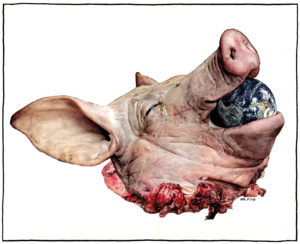
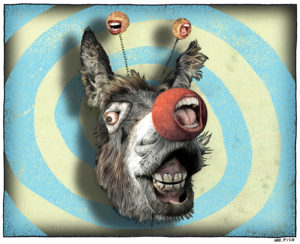
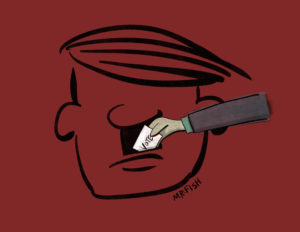
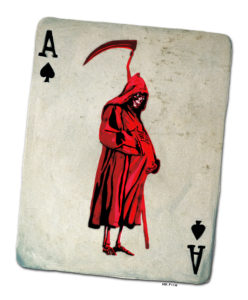
You need to be a supporter to comment.
There are currently no responses to this article.
Be the first to respond.